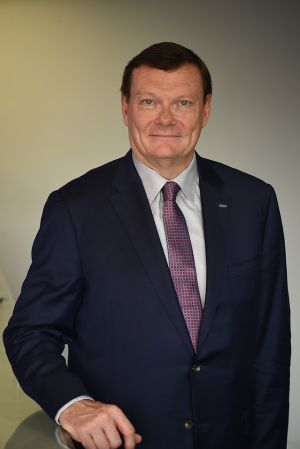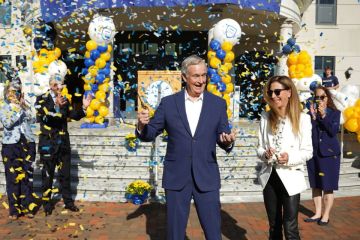From Widener History Classroom to Global Technology Executive

Terry Halvorsen carries a cell phone that holds one terabyte of information, and it’s his only digital device. Such a rare superphone comes with his professional territory, since he logs upwards of 400,000 miles a year for global business travel. Halvorsen is chief information officer and executive vice president at Samsung Electronics, one of the largest technology innovators in the world.
He also has a bachelor’s degree from Widener. In history.
The 1980 alumnus served at some of the highest levels of the U.S. military – chief information officer for the Department of Defense, for example – before heading to the private sector at Samsung in 2017. He is arguably one of the most connected people influencing future technology and electronic security. He is laser focused on 5G mobile data, and predicts its impact will be as significant as the printing press.
The skill Halvorsen calls on daily, like when he’s considering how 5G will boost safety for driver-assisted cars and throw the automobile insurance industry into disarray, or how it will enable farmers to measure whether their crops really need watering, he was introduced to at Widener.
“The skill I find most valuable, no matter what you are doing, is critical thinking, and the history department excelled at forcing you to hone your critical thinking skills,” he said, during an Oct. 2 visit to campus, facilitated by the Oskin Leadership Institute. He credited the talents of Lawrence Buck, Carlos Allen, John Jenkins, and the late Julian Skaggs, all who taught for the history department during his time at Widener, as outstanding. His experience demonstrates how Widener’s powerhouse programs, anchored by committed faculty, were dedicated to the personal and professional success of every student even three decades ago.
“Terry is also a great example of how access to, and networking with, alumni gives our students an inside track to successful careers. He challenged them to think about the future, and his professional trajectory showed them anything is possible when you start at Widener. I encourage more alumni to get involved and share their stories,” said Associate Vice President for Development and Alumni Engagement Jim Gulick.
Halvorsen chose Widener on an ROTC scholarship in the fall of 1976. The Chichester High School graduate liked that it was close to his Trainer, Pennsylvania home, and allowed him to continue with a property management job he’d held as a teen. He also liked following the football career of fellow Chichester High School graduate Billy “White Shoes” Johnson, who was playing for Widener.
“For me it was an easy choice,” he said.
Halvorsen entered Widener as a biology/chemistry major in 1976. It was not unusual for him to register for 24 credits a semester since his ROTC scholarship had no limits on the number of classes he could take. Night classes allowed him to squeeze more into his schedule and one class – on the administration of justice – was immensely helpful when he moved into intelligence work at U.S. Army Fort Huachuca in Arizona, after graduating the as the top ROTC cadet.
Over time, he rose through the military system, serving as deputy commander of the Naval Network Warfare Command, responsible for providing leadership for more than 16,000 military and civilian personnel and 800,000 globally dispersed computer network users, then deputy commander of Navy Cyber Forces, Department of Navy CIO and eventually CIO to the Department of Defense.
“In the 19th century, he would be referred to as a man of many parts,” said Buck, now emeritus professor of history, who taught Halvorsen western civilization and medieval history courses, and who attended a talk Halvorsen gave in the Alumni Auditorium during his visit to campus. “He reads widely and deeply. He knows a lot about a lot. He’s just an excellent example of what a good history major can be.”



